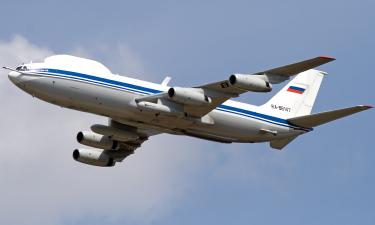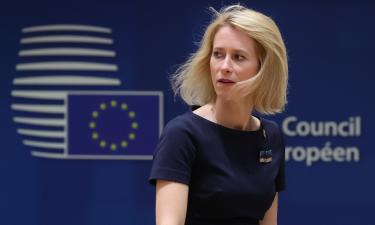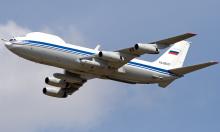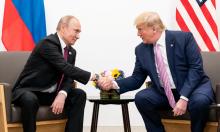Putin and Yushchenko end gas conflict together
President Putin did not want to lose the opportunity to score another point
The inauguration of Kazakh President Nursultan Nazarbayev in Astana was, without doubt, an event worthy of note. Suffice it to say that Nazarbayev inspected the guard of honor near his presidential palace when the thermometer read minus 30 degrees Celsius. The Kazakh people will certainly recall the very low temperatures on the inauguration day, and an ovation filling the house as Nazarbayev shook hands with the former Russian president Boris Yeltsin and his spouse. The former Kyrgyz president Ascar Akayev attended the ceremony rather inconspicuously. No local TV crews pointed their cameras to his direction. 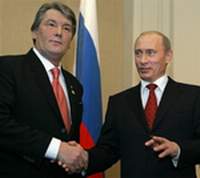
However, the majority of those in attendance will recall it by the meeting between Russian and Ukrainian presidents marking a formal end to the gas prices conflict between the two countries. Once the journalists heard the news about the dismissal of the Ukrainian government by parliament shortly after the former struck a reconciliation deal in the gas conflict, it became quite clear that the rendezvous between Putin and Yushchenko would held the spotlight in Astana.
Russian President Putin kicked off the meeting by stressing the importance of the latest arrangements between the two countries. “Both parties made the right and mutually profitable decisions with respect to the gas prices,” said Putin. “Hope you had a good rest and enjoyed your skiing,” added he and went on without missing a beat: “Hopefully, I will get an invitation from you for a holiday in the Carpathians.” In other words, Putin hinted at a new start in Russia-Ukraine relations now that the “right decisions” had been made. Yushchenko looked a little sulky as he was saying about his recent vacation in the mountains. “It was cold in the Carpathians, and the snow was scarce out there,” said the Ukrainian president. He then commented on the gas prices conflict and called it “the darkest episode in the history of Russia-Ukraine relations.” However, the conflict was “mutually beneficial,” according to Ukrainian president.
Meanwhile, President Putin did not want to lose the opportunity to score another point. He then spoke about the prospects for reaching agreements on the “road map” (simplified border control regulations for residents of the border areas; demarcation of the sea borders etc.) between Moscow and Kiev. Sounding ostensibly casual, the Russian president asked if his Ukrainian counterpart had signed the economic section of a decree on the establishment of the Russian-Ukrainian commission. No, the document still needed signing. As it turned out, President Putin signed the decree on December 28, at a time when the dispute over the gas prices was in full swing. It looked as though the Russian president had anticipated that the parties would finally sign an honorable peace accord. The Ukrainian president promised to catch up in the nearest future.
Then the press were told to vacate the meeting room. Nearly ninety minutes later the two presidents emerged before the journalists and briefed them on the outcome of their meeting. In short, a quotation from President Putin's statement is good enough for assessing the results: “It is for the first time in our longstanding relationship with Ukraine that we are dealing with the people who can keep their promises!” Putin did not elaborate on events that happened during the “longstanding relationship” between Russia and Ukraine. However, it is obvious that the period included the presidency of Leonid Kuchma. Moscow has finally rated Kuchma's work as unsatisfactory or so it seems. Meanwhile, it is still unclear whether the same rating applies to the activities of the former Ukrainian prime minister Viktor Yanukovich, the Moscow-backed presidential candidate during last year's election.
Viktor Yushchenko was equally eloquent while speaking about the end of an era of “feudal relations” between Moscow and Kiev. According to Yushchenko, “Russia was selling gas to Ukraine at half the price while Ukraine was charging Russia half the transit fees for pumping that gas to Europe.” From now onward the relations will be transparent and mutually profitable, said the Ukrainian president. The new situation looked almost perfect. The participants of the late night talks in Moscow on January 4 might as well deserved awards for bringing the “gas feudalism” to a close. Delivering his pre-statement to the press, Yushchenko extended his special thanks for the job well-done to a group of high-ranking bureaucrats including the CEO's of Naftogaz Ukrainy and Gazprom, Alexei Ivchenko and Alexei Miller, respectively.
A journalist from Unian news agency nearly spoiled the idyllic atmosphere when she put the following question to the two presidents: “Will Moscow keep saying that Ukraine was stealing gas at a time when Gazprom cut the supplies during the first days of January?” Putin spelled out that there were international organizations whose calculations included all relevant data.
The Ukrainian president elaborated on the subject. “Ukraine has never broken and will never break a single letter of our arrangements (regarding to gas export and transit operations) with Russia and Europe alike,” said Yushchenko. Ukraine replenished the shortage by 80% using gas from the Ukrainian storage tanks when Russia cut the deliveries, according to Yushchenko. When asked by Vremya Novostei about the ways used to make up for the remaining 20% of the undersupply, the head of Naftogaz Ukrainy Alexei Ivchenko plainly confessed: “We simply cut the domestic consumption.”
Later an independent gas expert who requested to remain anonymous, said that Yushchenko was wrong while referring to that 80 percent. The Ukrainian president had been misinformed by a member of his own team, according to the expert.
Neither Moscow nor Kiev is keen on reproaching each other. They are ready to start building a relationship from scratch yet another time. To make a point of those efforts, Putin and Yushchenko unveiled the plans to start working on new joint energy projects in the near future. However, the new projects turned out to be the old ones relating to the construction of new branches of a gas pipeline e.g. Uzhgorod – Bogorodchany, Pskov – Uzhgorod. The above will allow to “widen” the narrow sections of the existing major pipeline delivering natural gas from Russia to Europe.
Ukrainian Minister of Fuel and Energy was promoting those plans hard. He called them the restoration of the gas consortium project, which was designed way before the concept of a Russian-Ukrainian-German consortium came into being. In the meantime, sources in Gazprom were quite skeptical about the plans. They had doubts regarding prospects for Russian gas monopolist to gain control over Ukraine's gas distribution network.
So far Moscow has been skeptical with regard to Kiev's readiness to take part in a tender for the construction and supply of pipes to North European Gas Pipeline project. Secretary of Ukraine's National Security Council Anatoly Kinakh said recently that his country was ready to supply pipes to the project. The Russian side says it can provide Russian-made pipes for an overland section of the pipeline while the best-quality 210-atmosphere pipes for an underwater pipeline section can be purchased in Japan or Germany. At the press conference in Astana, neither Putin nor Yushchenko said anything regarding the possibility of Ukraine's participation in the project.
Ukrainian Prime Minister Yuri Ekhanurov is expected to make a visit to Moscow soon. Vremya Novostei believes that the Kremlin still does not care whether Ekhanurov will be referred to as “acting prime minister” in line with the decision of the Ukrainian parliament that dismissed the government, or he will be referred to as “prime minister” pursuant to Yushchenko's statement regarding the above decision of the parliament as being unconstitutional and therefore null and void.
Roughly three months before the upcoming elections in Ukraine, Russia seems to be stepping up implementation of the friendly intentions outlined in Astana. That is the reason behind yet another of Astana's arrangements with regard to a visit of newly appointed head of the Russian Atomic Agency Sergei Kirilenko to Kiev, which is slated for the near future. Russia and Ukraine intend to mine and enrich uranium, produce nuclear fuel and sell it on the markets of third countries.
Nursultan Nazarbayev now can, and with good reason, call himself a peacemaker for Russia and Ukraine. It was very prudent of him to “schedule” his inauguration right after the end of the gas prices conflict between Russia and Ukraine.
Discuss this article on Pravda.Ru English Forum
AP photo
Subscribe to Pravda.Ru Telegram channel, Facebook, RSS!

